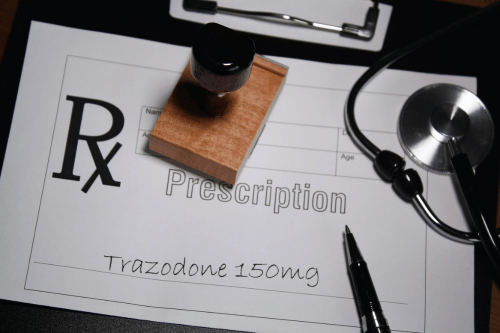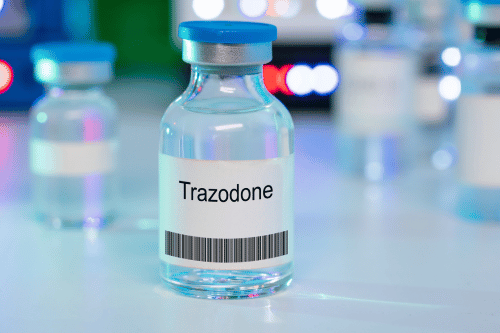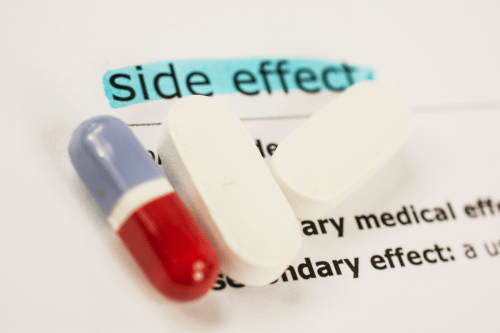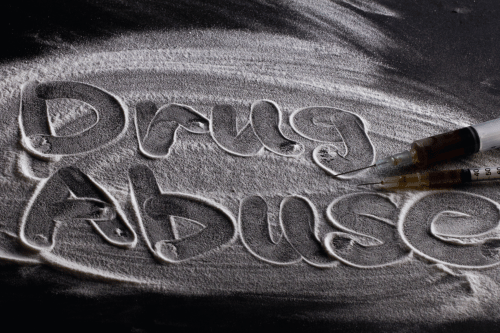

Trazodone is an antidepressant medication often prescribed to treat major depressive disorder, anxiety, and insomnia. It’s known for its efficacy in improving mood and sleep patterns, but concerns about its potential for addiction have surfaced over the years.
In this article, we will uncover the truth about trazodone, examining its side effects, potential for abuse, and withdrawal symptoms to answer the critical question: Is trazodone addictive?

Trazodone belongs to a class of drugs known as serotonin modulators. It works by affecting the balance of serotonin in the brain, which helps improve mood and alleviate symptoms of depression and anxiety. By increasing serotonin levels, trazodone can help regulate mood and reduce feelings of sadness and hopelessness.
This mechanism of action is particularly beneficial for those who have not responded well to other antidepressants. Unlike selective serotonin reuptake inhibitors (SSRIs), which work by preventing the reabsorption of serotonin, trazodone acts as a serotonin modulator to balance serotonin levels in the brain.
Trazodone is often chosen for its sedative effects, making it a popular option for those struggling with insomnia. Its sedative properties can help patients fall asleep faster and enjoy more restful sleep, which is crucial for mental and physical health. Unlike some other sleep aids, trazodone is less likely to cause dependency, making it a preferred choice for long-term use.
Trazodone is primarily prescribed for:
Major Depressive Disorder (MDD): Trazodone helps treat depression by balancing serotonin levels in the brain. Patients often experience improved mood, increased energy levels, and better overall mental health.
Anxiety: Trazodone can help reduce anxiety symptoms, contributing to overall mental well-being. It is particularly effective for those who experience anxiety as a comorbid condition with depression.
Insomnia: Due to its sedative properties, trazodone is effective in helping patients achieve better sleep. It is often prescribed for people who have difficulty falling asleep or staying asleep throughout the night.

While trazodone is beneficial for many, it is not without its side effects. Understanding these can help manage expectations and prepare for any potential issues. Patients should be aware of both the common and serious side effects to make informed decisions about their treatment. It is crucial to taper off trazodone under medical supervision to avoid severe withdrawal symptoms.

Some of the more common side effects of trazodone include:
Drowsiness: This is one of the most frequently reported side effects and can be beneficial for those using trazodone for insomnia.
Dizziness: Patients may experience lightheadedness, especially when standing up quickly.
Dry mouth: A common issue that can usually be managed by staying hydrated.
Blurred vision: This side effect is generally temporary and may diminish over time.
Constipation: Increasing fiber intake and staying hydrated can help alleviate this issue.
Weight changes: Some patients may experience weight gain or loss, often related to changes in appetite or metabolism.
In rare cases, trazodone can cause serious side effects, such as:
Severe allergic reactions: Symptoms can include rash, itching, swelling, and difficulty breathing.
Suicidal thoughts or behaviors: Particularly in young adults and children, close monitoring is essential.
Irregular heartbeat: This can be a sign of a more severe condition and requires immediate medical attention.
Priapism (a prolonged and painful erection): This is a medical emergency and needs urgent treatment to prevent long-term damage.
If you experience any of these serious side effects, it is crucial to seek medical attention immediately. Prompt intervention can prevent complications and ensure your safety.
One of the most pressing questions is whether trazodone is addictive. The answer is somewhat complex and requires a look at both the medication’s properties and patient experiences. Understanding the distinction between physical dependence and addiction is key to this discussion. While trazodone is not considered highly addictive, there are cases of trazodone addiction where individuals misuse the medication.

From a pharmacological standpoint, trazodone is not considered addictive. It does not produce the euphoric high associated with other addictive substances like opioids or benzodiazepines. Furthermore, it does not trigger the same kind of cravings or compulsive use behaviors. This makes it a safer option for long-term use compared to other medications that treat similar conditions. Unlike tricyclic antidepressants, which are known for their higher risk of side effects, trazodone is considered safer for long-term use.
However, it is essential to use trazodone as prescribed to avoid any potential issues. Misuse of the medication, such as taking higher doses than recommended, can lead to unwanted side effects and complications.
However, some patients report experiencing dependence on trazodone. Dependence differs from addiction in that it involves a physical need for the drug to avoid withdrawal symptoms rather than a psychological craving for its effects. This physical dependence can make it challenging to discontinue the medication without experiencing discomfort.
Some patients may develop a psychological addiction to trazodone, relying on it to feel normal or maintain happiness. This is particularly true for individuals with a history of substance abuse or mood disorders.
Patients may find that their bodies become accustomed to trazodone, requiring them to take it regularly to maintain its therapeutic effects. This is not uncommon with many medications and underscores the importance of medical supervision when making any changes to dosage.
While trazodone is not typically associated with abuse, it is not entirely immune to misuse, and some individuals may abuse trazodone. Understanding the potential for abuse can help patients use the medication responsibly and avoid harmful behaviors.
Trazodone abuse can occur when the medication is taken in higher doses than prescribed or used without a prescription. Some individuals may misuse trazodone in an attempt to achieve sedative or calming effects, particularly if they suffer from untreated anxiety or insomnia. Trazodone misuse is a form of antidepressant abuse, which can lead to serious health risks and diminish the medication’s effectiveness.
Abuse of trazodone can also occur in combination with other substances, such as alcohol or recreational drugs. This can increase the risk of dangerous interactions and exacerbate side effects.

Abusing trazodone can lead to several risks, including:
Overdose: Taking too much trazodone can result in severe drowsiness, respiratory distress, and potentially fatal outcomes. It is crucial to adhere to the prescribed dosage to avoid these risks.
Worsening Mental Health: Misuse of trazodone can exacerbate symptoms of depression or anxiety rather than alleviate them. This can lead to a vicious cycle of increased medication use and worsening mental health.
Physical Harm: As with any medication, misuse can lead to harmful physical side effects or interactions with other substances. This includes risks to cardiovascular health and other bodily systems.
Another essential aspect to consider is the potential for trazodone withdrawal symptoms when discontinuing the medication. Understanding these symptoms can help patients prepare for the process of tapering off the medication.
Withdrawal symptoms can vary but may include:
Anxiety: Increased feelings of worry and unease.
Agitation: Restlessness and irritability.
Sleep disturbances: Difficulty falling or staying asleep, leading to fatigue.
Nausea: A common withdrawal symptom that can affect appetite and overall well-being.
Headaches: Persistent headaches that can interfere with daily activities.
These symptoms can be uncomfortable but are typically temporary and manageable with proper medical guidance.
To manage withdrawal symptoms effectively, it is crucial to taper off trazodone under medical supervision rather than stopping abruptly. Proper usage and medical supervision are crucial when taking trazodone to avoid severe withdrawal symptoms. This gradual reduction in dosage helps minimize withdrawal effects and ensures a safer discontinuation process. Healthcare providers can create a tailored tapering plan to suit individual needs and minimize discomfort.
Patients should communicate openly with their healthcare providers about any withdrawal symptoms they experience. This allows for adjustments to the tapering plan and additional support as needed.

In summary, trazodone is a valuable medication for treating depression, anxiety, and insomnia. While it is generally not considered addictive from a pharmacological standpoint, it can lead to physical dependence and withdrawal symptoms if not used correctly. The risks of trazodone abuse and withdrawal underscore the importance of following a healthcare provider’s guidance when using this medication.
Understanding the potential side effects, risks of abuse, and withdrawal symptoms can help you make an informed decision about trazodone dosage and use. Always consult with your healthcare provider to determine the best treatment plan tailored to your needs. By using trazodone responsibly and under medical supervision, patients can maximize its benefits while minimizing potential risks.
At Sullivan Recovery, as an in-network provider we work with most insurance plans, such as:
And More
If you or a loved one are struggling with mental health challenges or substance abuse, reach out to Sullivan Recovery today. Our team of compassionate professionals is here to support your journey towards lasting well-being. Give us a call at 949-836-7180.
Trazodone is generally not considered addictive in the way that many other medications, such as opioids or benzodiazepines, are. It is an antidepressant that also has sedative effects, but it does not produce the euphoric “high” associated with drugs of abuse. However, some individuals may develop psychological dependence if they use it improperly, such as taking higher doses than prescribed or using it for purposes other than intended.
While trazodone is not typically associated with addiction, some people may develop a tolerance to its sedative effects over time. This means they may require higher doses to achieve the same level of sleep aid or relaxation. It’s important to follow the prescribed dosage and consult your doctor before making any changes to how you take the medication.
If trazodone is discontinued suddenly after long-term use, some individuals may experience withdrawal symptoms, such as anxiety, agitation, dizziness, or sleep disturbances. To avoid these symptoms, it is recommended to gradually taper off the medication under the guidance of a healthcare provider.
Trazodone is often prescribed for long-term use, particularly for managing depression or chronic insomnia. When used as directed by a healthcare professional, it is generally safe for long-term use. However, regular monitoring by a doctor is important to ensure the medication remains effective and to prevent potential dependency or side effects.